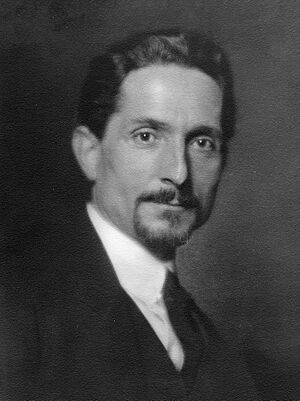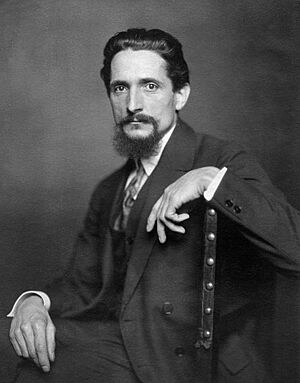Jakob Schaffner facts for kids
Jakob Schaffner (born November 14, 1875 – died September 23, 1944) was a well-known writer from Switzerland. He became a supporter of Nazism, a political idea that caused a lot of harm in the world.
Becoming a Writer
Jakob Schaffner was born in Basel, Switzerland. Sadly, both his parents died when he was young. He grew up in an orphanage, a home for children without parents. His experiences there later inspired his most famous book, Johannes. This book, published in 1922, was a bit like his own life story in the orphanage.
Before becoming a writer, Jakob worked as a shoemaker. As a young shoemaker, he traveled a lot. He visited countries like the Netherlands, Belgium, and France. These travels greatly influenced his writing, and many of his stories were about journeys.
He also studied at the University of Basel. In his early days, Schaffner was interested in communism, a political idea about sharing wealth. But he soon changed his mind and became a nationalist, someone who strongly supports their own country. He moved to Germany in 1912 after marrying a German woman. He felt a strong connection to German culture. He also had strong opinions about different religions and beliefs.
Supporting Far-Right Groups
Later, Jakob Schaffner returned to Switzerland. From 1936 to 1938, he was involved with the National Front, a political group. He then joined another group that supported Nazism. Nazism was a political movement that believed in extreme nationalism and racism.
Even though he was first unsure about Nazism, Schaffner soon became a strong supporter of Adolf Hitler. He believed Hitler could bring big changes to Europe.
During World War II, Schaffner moved back to Germany. He joined the Nazi Party and worked for Joseph Goebbels, helping to spread Nazi ideas. He rarely went back to Switzerland during this time.
Jakob Schaffner died in 1944 during an air raid on Strasbourg. He was buried in his hometown of Buus. After the war, his reputation as a writer was badly hurt. This was because of his strong support for Nazism.
Literary Works
- Irrfahrten (Wanderings) 1905
- Die Laterne und andere Novellen (The Lantern and other novellas) 1907
- Konrad Pilater 1910, a story about a shoemaker, showing parts of Schaffner's own youth
- Der Bote Gottes (The Messenger of God) 1911
- Die goldene Fratze (The Golden Fratze) 1912
- Die Irrfahrten des Jonathan Bregger (The Wanderings of Jonathan Bregger) 1912, a new version of Irrfahrten
- "The Iron Idol,” an English translation of one of his stories, appeared in Kuno Francke, ed., German Classics, v. 19, New York, 1914
- Die Weisheit der Liebe (The Wisdom of Love) 1919
- Konrad Pilater (new version) 1922
- Johannes 1922
- Brüder (Brothers) 1925
- Das grosse Erlebnis (The Grand Experience) 1926
- Die Jünglingszeit des Johannes Schattenhold (The Young Manhood of Johannes Schattenhold) 1930 (a follow-up to Johannes)
- Eine deutsche Wanderschaft (A German Journey) 1933 (the third Johannes book)
- Offenbarung in deutscher Landschaft. Eine Sommerfahrt (Revealing in German Landscape – A Summer Journey) 1934
- Berge, Ströme und Städte. Eine schweizerische Heimatschau (Mountains, Rivers and Cities – A Swiss Homeland Show) 1938
- Kampf und Reise (Struggle and Journey) 1939 (the final part of the Johannes series)
 | Frances Mary Albrier |
 | Whitney Young |
 | Muhammad Ali |



